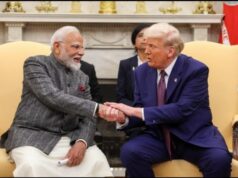New Delhi: Over a century ago, Armenian Christians in eastern Turkey were subjected to genocide and mass expulsion by the Ottoman Sultan Abdul Hamid. It is considered to be among the earliest examples of “ethnic cleansing”, with over one million Armenians killed. It is seen as the forerunner of the ethnic cleansing practiced by the Bosnian Serbs during the Bosnian civil war of 1992-95. To date, Turkey refuses to acknowledge that such a massacre happened, says Armenia’s Ambassador to India Armen Martirosyan. On the anniversary of the genocide (Apr. 24, 1915), Ambassador Martirosyan told StratNews Global’s Surya Gangadharan that modern Turkey refuses to establish diplomatic relations with Armenia, insisting that the genocide did not happen. Turkey’s current President Erdogan has also stalled protocols signed in 2009 with Armenia that would have normalised relations. Armenia’s support for its fellow Christians in the enclave of Nagorno-Karabakh in neighbouring Azerbaijan has added to the animus with Istanbul. Ambassador Martirosyan believes it is important that Turkey acknowledge the genocide to ensure future acts of this nature do not happen and more importantly, do not go unpunished. To us here in India, it brings to mind the 1971 genocide by Pakistan in former East Pakistan (later Bangladesh), which remains unacknowledged by Islamabad nearly 50 years on. The perpetrators of those crimes got away unpunished. The Armenian Genocide, therefore, holds crucial lessons for the world.
Watch the interview for more:
Thirty eight years in journalism, widely travelled, history buff with a preference for Old Monk Rum. Current interest/focus spans China, Technology and Trade. Recent reads: Steven Colls Directorate S and Alexander Frater's Chasing the Monsoon. Netflix/Prime video junkie. Loves animal videos on Facebook. Reluctant tweeter.




